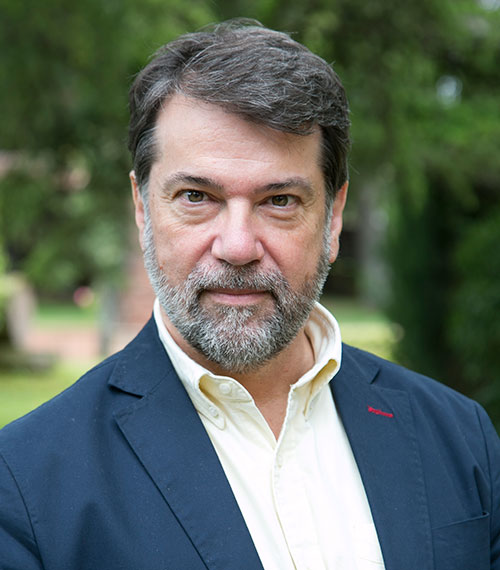Pedro L. Alonso (Madrid, Spain; 1959) graduated in medicine from the Universidad Autónoma de Madrid in 1984. He then went on to complete an MSc at the London School of Hygiene and Tropical Medicine, and later a PhD in the University of Barcelona.
From 1992 to 2000 he headed the Epidemiology and Biostatistics Unit at Hospital Clínic in Barcelona. In 1996, he founded the Manhiça Health Research Centre, CISM (Mozambique) where he served as Scientific Director until 2008. Other former posts include that of Head of the Center for International Health at Hospital Clínic de Barcelona (2001-2014), Director of the Barcelona Centre for International Health Research (CRESIB) (2006-2014) and Director of the Barcelona Institute for Global Health, ISGlobal (2010-2014), which he also founded.
He is currently Professor of Global Health at the University of Barcelona and Director of the WHO’s Global Malaria Program in Geneva (Switzerland).
Speech
Development Cooperation 9th edition
Micro interview
“Vaccines are one of the great achievements of mankind”
This far into the 21st century, parasites are still one of the greatest threats to human development. According to the WHO, they are responsible annually for the loss of over 55 million healthy life years. In 2015 the Plasmodium parasite alone infected 212 million people, of whom 429,000 died. Yet malaria, the disease caused by Plasmodium, is already 100% preventable and curable. How to explain this paradox? The clue lies in the name commonly used to refer to these parasitic infections: diseases “of poverty.”
It is poverty that multiplies the destructive power of these conditions, and they, in turn, debilitate the economies of the countries where they are endemic, in a kind of perverse symbiosis. In the words of the Global Technical Strategy for Malaria 2016-2030: “Malaria remains a major cause and consequence of poverty and inequity worldwide. It impedes economic development, stops children going to school, and absorbs the capacity of national systems to respond effectively to health security threats.”
But there is good news too. The prevalence of infectious and parasitic diseases has declined in recent years, and advances in knowledge in this area give cause to believe that the trend will persist in the medium and long run. The work of researchers Pedro L. Alonso and Peter J. Myler, winners of the Frontiers of Knowledge Award in Development Cooperation, are a big part of this success. Alonso’s contributions have been instrumental in achieving a 60 percent reduction in mortality rates over the past 15 years; Myler’s research is opening vital avenues for the development of future drugs or vaccines against these diseases.
Pedro L. Alonso is Professor of Global Health at the University of Barcelona, and, since 2014, Director of the WHO Global Malaria Program in Geneva (Switzerland). His first big breakthrough, published in The Lancet in 1991, was to show that insecticide-treated bed nets protect against malaria, an approach then viewed with a degree of skepticism in the absence of clear supporting evidence. Alonso’s team laid the controversy to rest through a trial in The Gambia, whose positive findings were later corroborated by other research groups. Over one billion bed nets have been distributed in the past ten years, making them “the front-line resource in the fight against malaria,” Alonso explains, describing them as “low-cost technology but hugely effective.” Bed nets are widely credited with bringing about the recent decrease in malaria mortality, equivalent to almost six million lives saved, many of them of young African children.
Alonso also led the first studies to prove that vaccination could be an effective strategy against malaria, a concept doubted at the time given the parasite’s extreme complexity. More recently, he headed trials of what is now considered the most advanced vaccine available, RTS,S, which the WHO will implement in pilot schemes in Sub-Saharan Africa in the year 2018.
Pedro Alonso, however, shifts the focus to another strand of his enterprise: “I am proud of having helped establish research centers of excellence, in Barcelona but also in one of the world’s poorest countries, Mozambique, led by Mozambican scientists.” Manhiça Health Research Centre (CISM) in Mozambique was founded in 1996 and is currently a global leader in its area. In 2010, Alonso set up the Barcelona Institute for Global Health (ISGlobal).
Peter J. Myler (Rockhampton, Australia; 1956) has spent most of his career in close physical proximity to parasites; not ‘wild’ parasites, this time, but those cultured for research purposes in the high-security insectarium at the Center for Infectious Disease Research in Seattle, United States.
For though he may not have done much fieldwork, Myler has a thoroughgoing knowledge of parasites and their vectors – in the case of Plasmodium, the Anopheles mosquito – that encompasses their genes, their protein structure, etc. This is because Myler is a pioneer in the application of modern biology technologies to the endemic diseases of developing countries. The resulting information is vital in the search for new treatments or vaccines: “The genome is like an organism’s parts list,” he explains. “It tells us about its internal mechanisms so we can find new tools to combat it effectively.”
Myler began his career researching into malaria at the University of Queensland in his native Australia, before moving to the United States. In 2005 he led the project that sequenced the genome of parasites Leishmania and Trypanosoma cruzi, which claim tens of thousands of lives each year, even though the conditions they cause are, like malaria, readily treatable.
Peter Myler is Director at the Seattle Structural Genomics Center for Infectious Disease, and the basic knowledge generated in his work has enabled identification of dozens of new pharmacological targets. A number of drugs now at the trial stage are a product of Myler’s contributions, though he is quick to warn that none of them will provide a definitive solution: “Parasites are continually turning resistant, so we will need to keep on developing the next round of drugs.”


